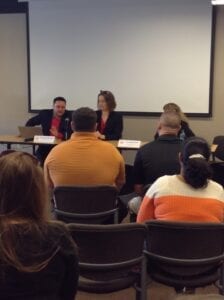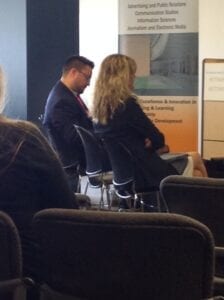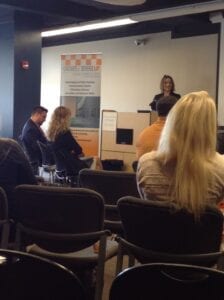Social Media Week addresses online faculty, student interactions
UT Social Media Week continues with a controversial debate of whether or not faculty and students should have engage in a friendly presence on social media.
On Wednesday, April 2, UT Social Media Week continued with a question and answer format entitled, “How social media can be used in and of out the classroom.” The segment touched base on the pros and cons of faculty using social media as a class assignment outlet.
Carolyn Hank, assistant professor at UT’s School of Information Sciences, Nick Bowman, assistant professor of Communication Studies and Research Association in the Media and Interaction Lab at the University of West Virginia and Karen Freberg, assistant professor in Strategic Communications at the University of Louisville each argued their cases before the Q and A began.




Hank, who labeled herself as the pessimist of the group, conducted her own research about the topic, which primarily focuses on how faculty and students are deciding to informally interact today. She said there is not enough research yet to prove whether faculty and student social interaction has a positive or negative outcome, but she chooses to not use social media as a classroom outlet.
She speculates if faculty is “well-behaved” enough to be online friends with their students, providing examples of “not so funny” tweets made by professors. When it comes to social media interactions, Hank questions whether faculty should have a friendly presence in social media with students.
Bowman’s argument was that social media can be used as a supplemental class activity, or a “third place” for mass lectures. Bowman teaches a class of over 300 students at the University of West Virginia, and he claims that while students might attend the lectures, “students are not really ‘there,’” he said.
Bowman conducted research on this topic and found that students who socially interact with their classes generally do better than those who do not.


Freberg’s argued that faculty and student friending on social media can benefit the students on an educational and personal level. Freberg makes clear to her students that they are more than welcome to friend her on social media, so long as they can “handle it,” she said. Freberg posts both personal and school-related announcements to reach out to her students.
Research is on-going as to whether or not this controversial interaction yields a positive or negative outcome.
Edited by Nichole Stevens

